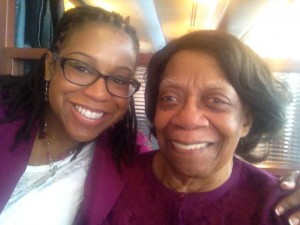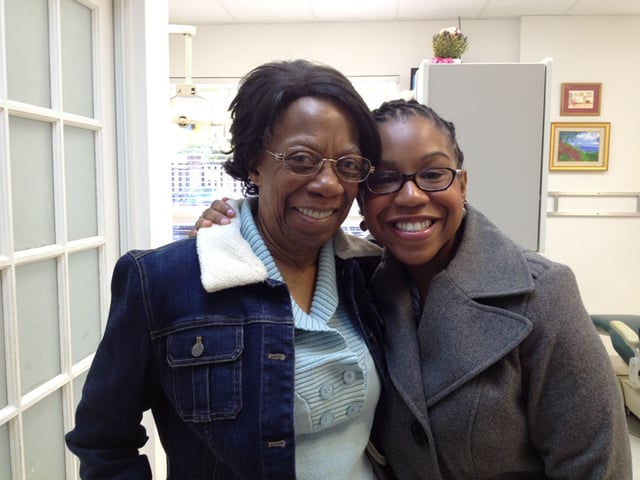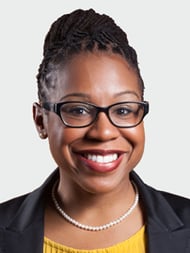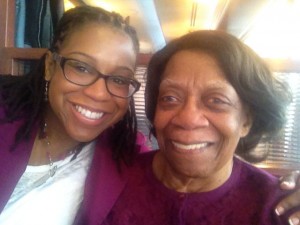Recently, I took my grandmother out to lunch. It was a beautiful day, and there was a restaurant less than half of a mile away from her assisted living facility in Northern Virginia. She may be 84 and have Alzheimer’s disease, but she still has a vibrant personality and is in great physical shape. I knew she would enjoy and could easily handle the walk. We went to eat, had an enjoyable lunch, and walked back. The staff at the assisted living facility were stunned we walked that far. I just had to laugh. My grandmother still prefers to run up the stairs because walking takes too long. Even though her memory puts limitations on her ability to care for herself, it has not slowed her down physically.

Chanda with her grandmother, Dorothy
Four years ago I would never have imagined that I would be the legal guardian for my maternal grandmother. But when my grandmother was left alone in her home in Upstate, NY, after my grandfather was hospitalized, I had some tough choices to make. My grandparents listed each other as their durable power of attorney, which allowed them to make financial decisions for the other in the case of incapacitation. Someone else in my family was the health care proxy, which permitted the individual to make medical decisions for my grandmother. I had no power to do anything, and she needed my help. One of my government benefits included an attorney referral service through which I could get a free consultation.
The attorney advised me that the only way I could care for my grandmother was to apply for legal guardianship. The guardianship would empower me to step essentially in her shoes and make all financial and medical decisions for her. It sounded straightforward, but guardianship is a costly and lengthy process. Still, it was a no-brainer for me. For all intents and purposes, she was my mother.
This was the woman who brought me up, made me clothes, tucked me into bed, and drove me to trumpet lessons and choir rehearsal. She was the first person I came out to and was amazingly supportive. She was supportive of my sexuality, and we would watch Queer as Folk together. She always encouraged and believed in me. There was no way I was going to leave her alone in her home, or at a substandard nursing home; not if I could help it. She was my legal guardian from a very young age. I would become hers.
With my wife backing me up, I slapped down my credit card for the attorney’s retainer fee. It took several months and several trips back and forth to New York, but I was eventually able to get legal guardianship and move my grandmother down to Virginia in the assisted living facility where she now resides.
Then I had to play catch up. From Virginia, I had to arrange for her house in New York to be cleaned up and sold. I had to take care of her back-taxes and overdue bills. I had to get her caught up on medical, vision, and dental care. I had to make sure she had everything she needed to live comfortably in her new residence. I had to do all this while grieving my grandfather who died shortly after I applied for guardianship for my grandmother, trying to excel at my job, and be there for my wife.
This process has underscored for me the significance of having legal documents that allow you to nominate individuals who can make medical, health care, burial, and other personal decisions for you in the case of incapacitation or death. If I had obtained the legal power to step in sooner, maybe things would have been easier.

Generations of smiles
These thoughts are ever present on my mind as my wife and I think about expanding our family. My wife and I got married in D.C., but lived in Virginia before the repeal of the Defense of Marriage Act (DOMA). Knowing that Virginia would not recognize our marriage, we knew how important it was for us to ensure we could make decisions for the other and our future children in case of incapacitation or death. We don’t want our future children to have to go through what we did with my grandmother.
The repeal of DOMA also gives me peace of mind where my grandmother is concerned. My wife and I are the only family my grandmother has in Virginia. Now if my grandmother went into the hospital and I was not around, I have faith that my wife, as family, would be allowed to see my grandmother until I could get to her. 2012 was a difficult year, but would I do it all over again? Absolutely. My grandmother is doing really well, and I’m looking forward to our next lunch walk tomorrow.
This post was written by Took Trust Scholar Point Scholar Chanda Brown

Since her junior year in high school, Chanda Brown has stood out as an openly queer woman and an advocate and leader for LGBTQ people.. Read more about Chanda.

